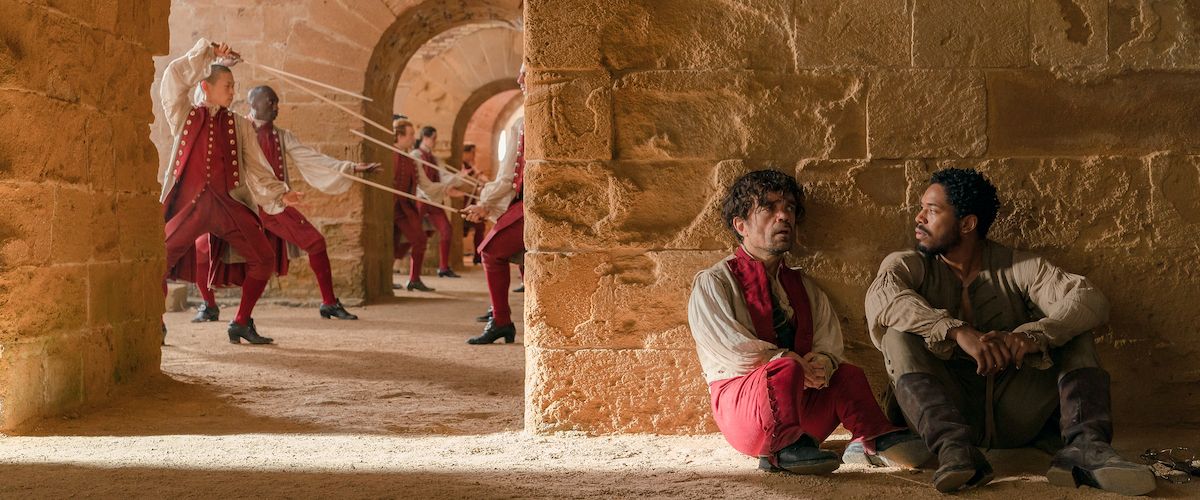By Jonah Naplan
February 26, 2022

CRITIC'S PICK
Review: In 'Cyrano,' Peter Dinklage explores intense themes through song.

By Jonah Naplan
February 26, 2022

“Cyrano” is an interesting film. One that has big ideas and expresses them thoroughly through the magic of filmmaking. The movie is based on a famous play, “Cyrano de Bergerac,” and it’s clear early on that it draws much inspiration from that source material, although I haven’t seen it. It’s a little difficult for me to criticize a film such as this one, because I’m so unfamiliar with its genre. Whenever I find myself reviewing a musical, it’s often that I’ll end up reviewing the music and singing more than the story at hand. I’m assuming this all draws back to the intentions of the filmmakers, but as an audience member, I’ve learned over time that a movie musical requires so much more than snappy tunes. Last year’s, “Tick, Tick…BOOM!” for example, was brilliant in how it combined a compelling and well-directed true story alongside its catchy music that I still haven’t stopped listening to.
The music in any movie is a nice touch, but more often than not, that music already existed in some previous source material. A film needs original content to be criticized without feeling like you’re just reviewing scenes scripted on Broadway twenty years ago. My favorite thing about “Cyrano,” is that it’s so much more than its music. It has fascinating characters, a compelling plot, and a searingly beautiful production design. This way, when the music does come along, it’s earned, and does feel like a nice touch afterall.
Peter Dinklage plays Cyrano, an underappreciated poet and talented swordsman. He longs to have a relationship with the dazzling Roxanne (Haley Bennett), but knows he has no chance against her personal love interest, Christian (Kelvin Harrison Jr.) Roxanne asks Cyrano to tell Christian of her love, and requests that he begin to write her letters. But after making an agreement with Christian himself, in a high-wire act, Cyrano begins to write his beautifully poetic letters to Roxanne under Christian’s name. And as the plot requires, Roxanne falls for this arrangement, making for some of the most entertaining scenes in the movie, particularly one, a famous scene from the play apparently, where Roxanne asks Christian to speak in the same way he writes in his letters. Christian stumbles upon his words, and in a later scene, Cyrano is nearby, mouthing what to say, as Christian stands before Roxanne, apologizing for his clumsiness. It’s scenes like these that really symbolize the smart characters that director Joe Wright has successfully identified. Without them, the film would be a professionally-made dud.
As “Cyrano” is a period-piece, it would be expected that the world it creates differs from the one we live in today. The film doesn’t give a specific time in which the story takes place, but after doing a quick Google search, my prediction was correct. The film takes place in the 17th century. Why do I bring this up? Because the film does such a great job of capturing that time period, without ever telling what time period it’s indicating. The world around our characters appears so real, that I almost felt like a fly on the wall, observing many scenes as if I was there. And spiritually, dare I say, I was there. The captivating cinematography in “Cyrano,” draws the viewer into sequences that wouldn’t normally work in an inferior movie musical.
The performances are stellar, particularly Dinklage who is the best he’s ever been, in a role that fully utilizes his set of skills better than any film ever has. The way he interacts with other characters, and the way he demonstrates controlled emotion throughout is nothing short of extraordinary. Whenever Cyrano delivers his profound monologues, or reads aloud to Christian a letter, the sequences play out almost as if the words are coming from Cyrano directly, like the dialogue was improvised on the spot, rather than by screenwriters brainstorming together over text messages or in a room full of story boards.
I enjoyed the singing in many scenes, particularly one where a group of soldiers speaks of their troubles. The beauty that radiates from each of these moments feels special, like the audience is watching something from a different angle than anyone ever could. There was another scene, a montage, where Cyrano is shown writing his letters to Roxanne while simultaneously singing a trio with Roxanne and Christian. Not only do the vocals sound nice, but the moment is inspiring.
The relationship between Cyrano and Roxanne feels realistic, like they were actually the makeshift siblings they claimed they were. And when you add Christian to the mix, it really is a smart dynamic trio. The development of these three characters, particularly Cyrano, makes the film worth watching for that reason by its lonesome self. But the remarkable thing about “Cyrano” is that it has many great things working towards its success.
In an extended dialogue-driven sequence whereas we find Cyrano laying down next to Roxanne, each emotional moment from the rest of the film pays off in a meaningful manner. And when the audience realizes that this is the final scene for both characters, the full emotional weight kicks in, and you realize just how well set-up much of the film has been. The closure that this scene provides perfectly encapsulates why “Cyrano” works in the first place. In this simple moment, the director’s use of silence has never felt more powerful, and each big idea that the film has to offer, compiles itself into one big tour de force, if you will. Between the singing, sword-fighting, performances, and emotional impact, I have to say that as a movie musical, “Cyrano” is pretty darn near ideal.
"Cyrano" is rated PG-13 for some strong violence, thematic and suggestive material, and brief language. It's 123 minutes.
JONAHtheCRITIC.com